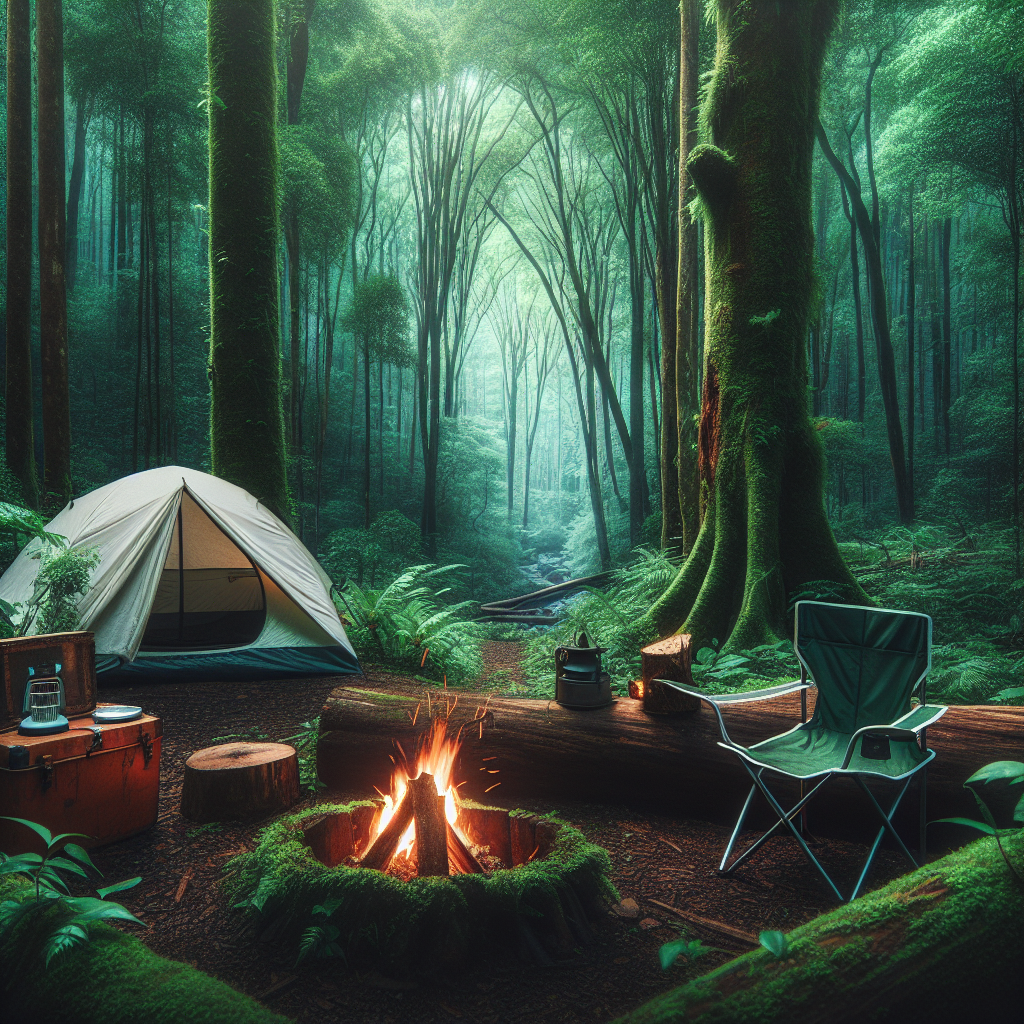Imagine yourself basking in the freedom that the great outdoors offers. Sounds exciting, right? In this article, “The Psychology of Camping: Why It’s Good for Your Mind,” you’re about to uncover why engaging in outdoor adventures like camping can bring transformative changes to your state of mind. At TrailTrekTribe.com, we pay homage to the untamed wilderness and its profound impact on our mental wellbeing. Filled with profound insights, first-hand experiences, and valuable tips, this piece serves as a compass, guiding you towards a path that not only nurtures an adventurous spirit, but also contributes to a healthier mind. So brace yourself as we unravel the therapeutic wonders of camping and why it resonates deeply with our psyche.

Understanding the Psychology of Camping
Camping is so much more than just a fun way to connect with the wilderness. It enables us to interact and connect with nature, freeing our minds from the bandwidth of urban lifestyle and reconnecting us with our primeval roots. Whether you’re a seasoned camper or a novice, understanding the psychology behind camping can enrich your experience and help nurture your mind.
The science behind outdoor pursuits
When you embark on an outdoor pursuit like camping, your body and mind respond to the novel environment. In the tranquil setting, away from the hustle and bustle of city life, your brain can reset, resorting to a calmer, more focused state. Your senses heighten, and you become more attuned to your environment. This transformation is not merely anecdotal; it’s backed by scientific studies indicating that camping and outdoor activities have numerous physiological and psychological benefits.
The human-nature connection
The notion of biophilia postulates that humans have an innate urge to connect with nature. This connection is underpinned by our evolutionary history as hunter-gatherers. Camping allows you to foster this intrinsic relationship. As you explore new landscapes, navigate trails, or simply marvel at the beauty of Mother Nature, you rekindle this bond with the natural world, which is known to induce feelings of calmness and tranquility.
Connection with Nature
Diving into the world of camping immerses you in the beauty and serenity of nature, and this intimate connection has a profound impact on your mental health.
Nature’s influence on mental health
Spending time in nature can do wonders for your psychological wellbeing. Studies consistently demonstrate that individuals who spend more time in green spaces report lower levels of stress, anxiety, and depression. Exposure to the diverse stimuli in nature, such as the rustling of leaves, the singing of birds, or the ripple of a stream, can instill tranquility, helping to quiet the mind and promote relaxation.
The benefits of green environments
Green environments like forests, parks, and natural trails aren’t just pleasant to look at. They have a therapeutic effect on the mind. These environments can potentially decrease brooding, that is, the tendency to engage in repetitive negative thought patterns – a common symptom of depression and anxiety disorders. The natural light, frequent exposure to colorful flora, and clean air that camping offers can aid in cognitive restoration, providing a mental boost.
The healing effect of natural sounds
The sounds of nature, from the gentle rustling of leaves to the rhythmic flow of a stream or the chirping of birds, can have a soothing effect on our minds. They can help lower stress levels and potentially aid in enhancing mood, concentration, and even sleep quality.
Camping and Stress Reduction
One of the incredible benefits of camping is its potent stress-busting effect.
How camping helps reduce stress
Camping can serve as a significant stress reliever by fostering a sense of detachment from daily stressors. As you immerse your senses in the tranquility of nature, your mind can refocus and relax. This can aid in releasing tension and reinstating calmness, ultimately fostering improved mental health and wellbeing.
The role of camping in cortisol (the stress hormone) reduction
Cortisol, also known as the “stress hormone,” increases in response to stress and potentially disrupts sleep and promotes anxiety. Studies suggest that time spent outdoors, as in camping, can help reduce cortisol levels. The tranquility of nature and the absence of daily stressors can aid in balancing your cortisol levels, hence promoting relaxation and rejuvenation.
Improved Concentration and Creativity
Camping isn’t all about physical activity; it can also bolster your cognitive capabilities and creativity.
How exposure to nature improves focus
When you spend time in nature, you tune in to its calming and diverse stimuli, gracefully shifting your focus away from digital screens and urban landscapes, which can sometimes overburden the brain. This shift can aid in enhancing attention span, focus, and cognitive function, allowing you to concentrate better and process information more effectively.
The impact of camping on creativity and problem-solving
Removing yourself from the daily routine and immersing yourself in nature can stimulate creativity and enhance problem-solving abilities. The novel environment, the challenge of setting up camp, or navigating the outdoors, can instigate innovative solutions. In the quiet rapture of the wilderness, your mind might stumble upon new perspectives and ideas that were laying dormant in the clutter of your daily routines.

The Physical Healthful Benefits of Camping
While camping is known to nurture mental health, it also benefits your physical health in numerous ways.
Exercise’s role in psychological wellbeing
Camping often involves hiking, setting up tents, collecting firewood, and other physical activities. These activities not only build endurance and muscle strength but also trigger the release of endorphins, the ‘feel good’ hormones, in your brain. Endorphins can help induce a sense of happiness and fulfillment, promoting psychological wellbeing.
Sleep improvement during and after camping
Sleeping under the stars can reset your biological clock, aiding in the regulation of melatonin, the sleep hormone. Exposure to natural light during the day and darkness at night can realign your circadian rhythm, promoting better sleep quality.
Camping and Mindfulness
Camping gives you the opportunity to immerse yourself in the present moment and encourages mindfulness, a practice proven to enhance mental health.
How camping encourages mindfulness
While camping, you naturally observe the details around you – the rustling leaves, the cool breeze, the patterns of the clouds. This attentive observation enables you to live fully in the moment, fostering mindfulness. This practice can potentially enhance your mental clarity, emotional intelligence, and even self-compassion.
The benefits of mindfulness in mental health
Mindfulness has been associated with lower levels of stress, anxiety, and depression. It can allow you to better understand and regulate your emotions, encouraging a more balanced mental state. Mindfulness can also improve your relationship with yourself and others, fostering empathy and understanding.
Social Aspects of Camping
Camping also has a social dimension that can cultivate a sense of belonging and strengthen relationships.
Fostering community through shared experiences
Camping invariably involves shared experiences– setting up the campsite, cooking meals together, telling stories around the campfire. These shared activities can create a sense of camaraderie and build meaningful connections, fostering community.
Strengthening family bonds through camping
When families camp together, they share experiences, solve problems collectively, and create unforgettable memories. Camping can provide family members with a unique opportunity to bond, away from their daily routines and distractions, fostering closer relationships and communication.
Camping as Therapy
Though it may not be a conventional form of therapy, camping has therapeutic benefits.
The implementation of wilderness therapy
Wilderness therapy is a form of treatment that leverages outdoor activities and experiences to promote mental and emotional growth. It often includes camping, backpacking, and other adventures in the wilderness. Activities within wilderness therapy are designed to teach resilience, problem-solving, and self-reliance, promoting self-confidence and emotional growth.
Case studies of outdoor treatment programs
Various outdoor treatment programs successfully incorporate camping as a form of therapy. These programs use nature-based interventions to support individuals facing mental health challenges. By engaging in camping activities, individuals can foster their connection with nature, develop resilience, and enhance their overall psychological wellbeing.
Promoting Sustainable Practices
With all its benefits, camping should be conducted responsibly to protect the environment.
How mindful camping benefits the environment
Engaging in mindful camping means leaving no trace, respecting wildlife, and reducing waste. Practising these habits benefits the environment by minimizing the impact on natural ecosystems and promoting the preservation of these beautiful outdoor spaces for future generations of campers.
Camping as a means of fostering environmental stewardship
Camping also offers an excellent opportunity to foster environmental stewardship. By observing nature and understanding its importance, campers can build a profound appreciation for the environment. This appreciation can foster environmentally responsible behaviour, making campers better stewards of the environment.
Making Camping a Regular Part of Life
Regularly integrating camping into your life can bring about long-term benefits for your physical and mental health.
The long-term effects of regular camping
Long-term engagement with camping can provide an ongoing outlet for stress relief, enhance cognitive function, creativity, and physical fitness, and help foster more robust social connections. Repeated exposure to nature through camping can ward off mental fatigue, improve mood, and even help mitigate symptoms of depression and anxiety over time.
Tips for integrating camping into a balanced lifestyle
To make camping a regular part of your life, start by scheduling short camping trips regularly. You can also join a local camping group or participate in nature-oriented activities. Remember to opt for sustainable camping practices to ensure you are giving back to nature, as much as it gives to you.
Understanding the psychology of camping and experiencing its myriad mental health benefits can enrich your life and broaden your perspective. So why wait? Grab a tent, pack a backpack, and let’s embrace the thrill of the outdoors together. Welcome to the wild!

